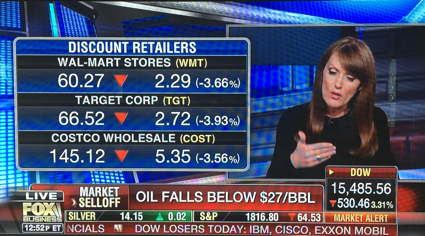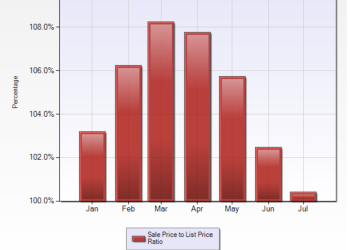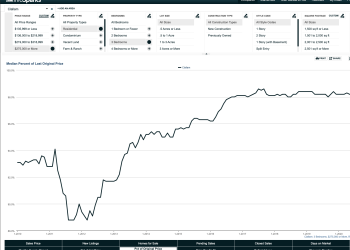This stock market volatility is scaring a lot of people, including fund managers. When the Dow is up and down over 400 points on consecutive days, it’s not a good sign for the weeks ahead. The Dow is down already 1,900 points in the first two weeks of 2016. Not a great start for the year. If you have a large retirement account invested in the stock market, riding a market roller coaster is a very uncomfortable feeling. This has already impacted how some people near retirement are thinking about the timing of buying their retirement home, and how much of a retirement home they can afford.

Stock Market Volatility History
If you look at the history of the stock market, substantial moves are often preceded by stock market volatility over a period of weeks, but even this is not a guaranteed indicator of a market decline. So what is a person to do in the uncertainty?
We are watching oil prices drop to surprising levels, and this has big implications for International markets. The reason Al Jazeera just went out of business in the U.S. a few days ago is because oil prices dropped, and the owner, which is the country of Qatari, cannot afford to subsidize Al Jazeera anymore. The drop in oil prices is causing middle east countries to liquidate sovereign wealth funds, and that means billions of dollars in selling on International markets. Add to that the declining China market, the struggling Japan economy, the unstable middle east, the grave uncertainty in the U.S. economy (and political scene), and people are understandably nervous.
Here’s my pet peeve. In every market decline (if we have one, and I’m not saying we will), Registered Investment Advisers and Fund Managers all say the same thing, “Now is not a time to sell. We always tell our clients that they should invest for the long term. If you look at markets over a 50 year to 80 year time period, stocks go up. In fact, we are advising our clients to buy on the dips. Dollar cost averaging is the key to a long term strategy.” If you’re planning to retire in a couple of years, this kind of advise for the next 80 years is not reassuring.
Stock Market Volatility and Advisers
Many investment advisers have been saying in the past few days that they expect the market to decline “some more,” so many are admitting they see a decline coming. Despite this, why would they not recommend that you liquidate some of your account? If most advisers told their clients to liquidate some or all of their stock holdings, the markets would crash, and we can’t have that, can we? I suspect many investment brokerages prohibit their advisers from advising clients to liquidate, because of the market chaos that could create. Here’s the problem with that. You personally get sacrificed for the sake of the market as a whole! Even if your adviser believes it would be in your best interest to liquidate some or all of your account because he sees stock market volatility as a sign of a major decline coming, he will not tell you. So you are sacrificed for the sake of the many.
In past market declines I have heard from people who watched their retirement accounts lose 30% or 50% or even 70% in one case. All the way down their advisers kept saying don’t sell. That’s easy for them, because fund managers get paid 1.25% of all funds under management, so they make money no matter what, as long as you don’t pull your money out of the market. Of course, selling would incur taxes and penalties for you, and that’s a big concern. But for all those clients who lost 50% of their retirement account in a market decline, how many would have gladly paid the taxes and penalties and still have been way ahead?
Stock market volatility is a warning sign. Of what . . . remains to be seen, but it is a red flag, and ought to cause everyone who has a lot of money in the stock market to pause and seriously think about where their money is safe. I would be cautious about taking advise from a man or woman (or who has a fund manager) who makes money based on “funds under management.” They have no motivation to see you liquidate, and every motivation to see you stay in the market even if you lose your life’s savings. I agree with them when they say that you should not panic. On the other hand, if panic means saving you hundreds of thousands of dollars in a declining market, maybe a little panic thinking can motivate a person to do something that turns out right.
Is liquidating some of your retirement account and investing it in a retirement home a good idea? I’ll leave that up to you, but this is a valid question for your perusal. At the least, stock market volatility should make you rethink what your adviser is telling you to do.
Disclaimer: This is not a recommendation to either sell or buy stocks, bond, or any other investment. Talk to your expert for advise. While I was an attorney and Registered Investment Adviser at one time, I am not an adviser now, nor do I give investment advise. But stock market volatility of this kind can make anyone nervous.
Last Updated on September 6, 2019 by Chuck Marunde


































